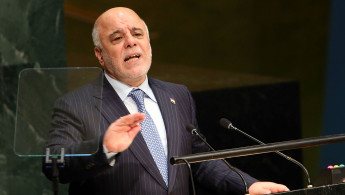Abadi's reforms will drive skilled Iraqis away, politicians warn
The head of the Iraqi parliament and other leading politicians have sounded alarm bells over the prime minister's plans to cut public sector worker salaries.
2 min read
Abadi's reforms are proving ever-more controversial [Getty]
Salim al-Jabouri, the head of the Iraqi parliament, has warned Prime Minister Haidar al-Abadi's decision to reduce the salaries of government officials could result in skilled Iraqis leaving the country.
Objecting strongly to the measure, Jabouri said it had to be done "in accordance with the constitution and in a way that guarantees Iraqi skills will not be lost".
The new salary scales for government employees are part of a wider package of reforms Abadi is attempting to pass to reduce corruption and waste, and improve the performance of government in the oil-rich, strife-torn country.
The head of the Daawa block, Khalaf Abd al-Samad Khalaf, told Shafaq News on Thursday he was also concerned the new salary scale would be a factor in the emigration of skilled Iraqis.
"We are for the reduction of the wages of the three leaders [the president, the prime minister and the speaker], and the members of parliament, but not those of employees with limited incomes, who have technical skills and experience," he said.
"The implementation of reforms should not be done like this, to the detriment of a large number of employees."
The measure, part of Abadi's proposed package of reforms, has provoked a wave of angry opposition from politicians and employees alike.
Iraqi officials and university lecturers have held sit-ins and marched on demonstrations, criticising the reform campaign and calling for the corrupt to be held to account - instead of the wages of officials being reduced.
Salim Shawqi, a member of the Iraqi parliament's Legal Committee told al-Araby al-Jadeed that the old salary scales had been established by law - and only another law could change them.
Usama al-Nujayfi, the head of the United for Reform coalition, meanwhile said that instead of being part of the solution, the salary scale shift would affect the interests and rights of sections of the citizenry and its skills.
Objecting strongly to the measure, Jabouri said it had to be done "in accordance with the constitution and in a way that guarantees Iraqi skills will not be lost".
The new salary scales for government employees are part of a wider package of reforms Abadi is attempting to pass to reduce corruption and waste, and improve the performance of government in the oil-rich, strife-torn country.
| The implementation of reforms should not be done like this, to the detriment of a large number of employees - Khalaf Abd al-Samad Khalaf |
"We are for the reduction of the wages of the three leaders [the president, the prime minister and the speaker], and the members of parliament, but not those of employees with limited incomes, who have technical skills and experience," he said.
"The implementation of reforms should not be done like this, to the detriment of a large number of employees."
The measure, part of Abadi's proposed package of reforms, has provoked a wave of angry opposition from politicians and employees alike.
Iraqi officials and university lecturers have held sit-ins and marched on demonstrations, criticising the reform campaign and calling for the corrupt to be held to account - instead of the wages of officials being reduced.
Salim Shawqi, a member of the Iraqi parliament's Legal Committee told al-Araby al-Jadeed that the old salary scales had been established by law - and only another law could change them.
Usama al-Nujayfi, the head of the United for Reform coalition, meanwhile said that instead of being part of the solution, the salary scale shift would affect the interests and rights of sections of the citizenry and its skills.





 Follow the Middle East's top stories in English at The New Arab on Google News
Follow the Middle East's top stories in English at The New Arab on Google News


